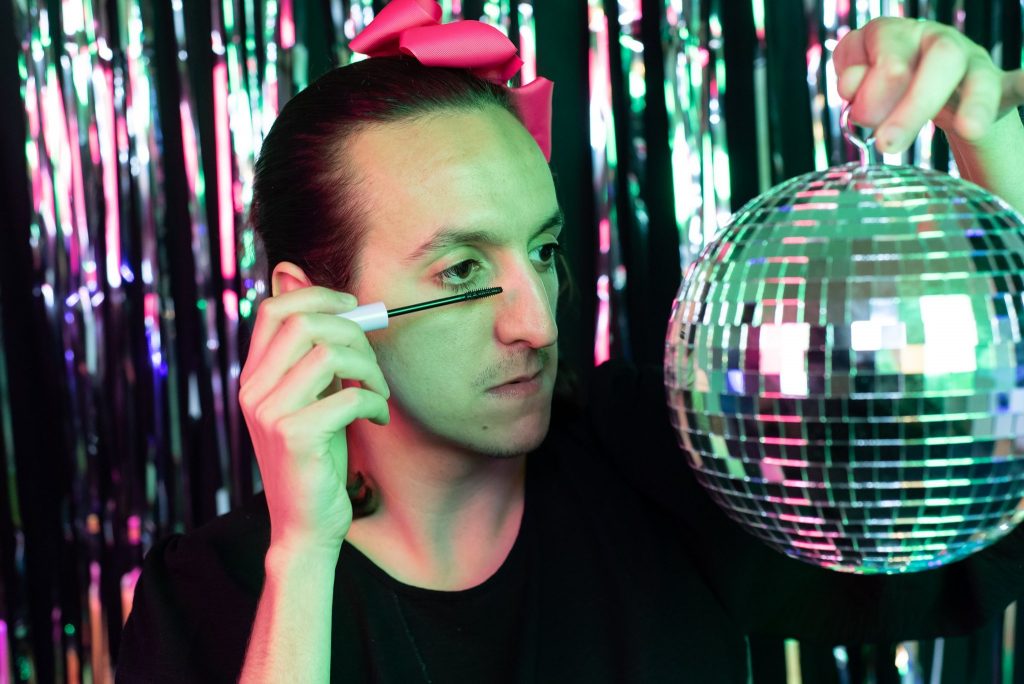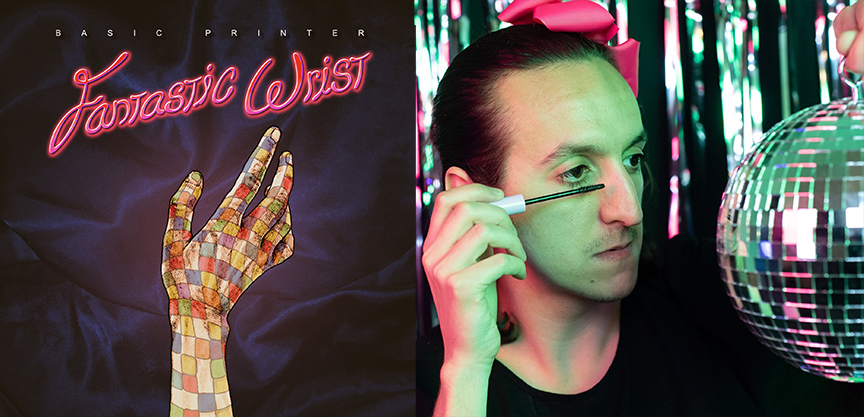By Keith Walsh
Jesse Gillenwalters of Basic Printer creates sounds that are weirdly different, unlike anything else, without losing accessibility. His dynamic, theatrical approach to performing comes across on his eclectic recordings, the latest being “Fantastic Wrist,” which expands on the funk pop of his previous release “Good Weird,” with a rich, art rock sound that’s fun to listen to.
With orchestrations and co-production by Aaron Walters, “Fantastic Wrist” is a concept album about states of mind and retreating into video games as a way of dealing with the stress of heartache and disappointment. “Fantastic Wrist” builds on a Basic Printer’s pop foundations, getting into prog rock territory at times, with Gillenwalters ‘ agile voice perfectly suited for the complex arrangements. I was lucky enough to have the chance to ask him some questions upon the digital release of “Fantastic Wrist.” Enjoy.
Synthbeat: I hear an 80s kind of funk sound and Motown influences also. What did you listen to growing up?
Jesse: It’s funny, I hear ‘80’s’ and ‘funk’ all the time, but that really wasn’t a major part of my upbringing – except for that one stretch of time when I listened to ‘Papa’s Got a Brand New Bag’ on repeat for months. I think I put off that vibe sometimes as a result of the more indie contemporaries that I love. For example, I love Black Moth Super Rainbow and Tobacco, and he uses a lot of 70’s/80’s synths, even though his sound is not very 80’s. I might just be unintentionally backtracking from there.
Synthbeat: There’s a lot of theatre in your presentation. How did that develop?
Jesse: I -love- concept records, and most of the time there’s at least some mild concept going on in one of my records. The theatrics were less of an intention and more of a discovery that we leaned into a bit more. I think Aaron Walters (who helped complete and arrange the orchestrations) imbued some of his influence there – he has performed in countless academic and higher-art musical ventures and has a penchant for the ‘cinematic’.

Synthbeat: How do you play the Roland 404 sampler? Is it kind of random or do you play patterns that you have programmed into the pads?
Jesse: As much as I can, I like to set up the sampler to manually recreate as much as possible of the track, otherwise it feels sort of like cheating. In the ‘Smoke & Scowl’ performance video, you can see that I’m playing the beat as a whole initially – but then I switch to a programmed version of that beat with a little more added in. I like the flexibility of being able to ‘switch’ to automation in case I need to run to another instrument, like…a theremin!
Synthbeat: You pick unusual sounds that I find quite refreshing, different than ordinary electronic music.
Jesse: Thanks so much. When it comes down to it, I’m not really making electronic music, perhaps? I’m definitely not operating within the typical genres and subgenres, anyhow. I like to call it more of a synth-heavy indie experiment or something.
Synthbeat: Another refreshing thing about your songs are the basslines. You avoid the ‘sequence trap’, or the pulsing cliché of some electronic music. Do you hate pulsating basslines? 🙂
Jesse: Haha, well no, but I guess when I’m making music I’m trying as much as I can to think about if I was cloned 8 times to become the band that was playing this recording. Is copy and pasting the bassline from chorus to chorus a good idea in that situation? I don’t think so. For a house song, it might be the perfect choice though.
Synthbeat: ‘Fantastic Wrist’ has lots of orchestra. What was the secret to getting virtual sounds to be so authentic? Not so much in the mixing but in the articulation and playing?
Jesse: That’s all Aaron Walters. Sorry to ruin the magic for those reading, but most of the dense orchestral stuff is a virtual instrument, as you said! Since Aaron has written for and conducted large ensembles before, he has a great ear and approach for making the digital versions of these instruments feel super real.
Synthbeat: ‘In Tetris’ you refer to the game ‘curing your depression.’ As a gamer how do video games serve a positive role? Even when one plays them instead of doing essential tasks?
Jesse: What’s funny is that I’m not much of a gamer these days. When I do play a game, it’s usually an older one on the N64 or something. When I wrote ‘Tetris,’ I decided to revisit my Tetris to try to clear my mind, but what I found interesting was that it sort of just zones me out and then all I focus on is what’s bothering me. So, lesson learned – if I’m trying to ease my mind, I should play a game that demands more of my mind and imagination, haha.
Synthbeat: Do you prefer classic arcade games or the latest on PSP or XBox? What are your favorites?
Jesse: The N64 is my favorite console, definitely. I usually play through Super Mario 64 once a year or so. That aside, I love Harvest Moon 64, Mario Kart, Paper Mario, Tony Hawk 1 + 2 – you know, the usual hits!
Synthbeat: Ultimately Tetris helped you accept the loss of a romantic relationship that spanned many years? You’re still friends with her?
Jesse: Did Tetris help? Maybe, haha. It was just an outlet for anxiety. It’s hard to say if I’d call us friends or not. I have admiration and major respect for her, but it’s unfortunately just best that I stay out of her way, so we don’t really speak these days. But again, not out of malice – just for health reasons.
Synthbeat: ‘Smoke and Scowl’ is about a rival? (I get that for discretion you might not provide details).
Jesse: Well, it’s about a rival – but it’s more about a “perceived” rival and how silly that is. It’s kind of about when you see someone that you feel like you’re supposed to dislike without even giving them a chance. It ends up being more of a reflection of yourself than them. This song was about running into my ex with her new boyfriend, and just not being able to get over how possessive I felt.
Synthbeat: ‘No God’ shows the bitterness of the spurned romance?
Jesse: Perhaps? It’s more of a relegation to the issues I’m facing regarding it. It felt like in every little crevice of my life, both physical and nonphysical – she’d be there in some fashion. Dreams, thoughts, feelings, etc – I’m not a religious person in any way shape or form. But, I started to realize that she was kind of becoming my religion. That’s what the song’s about.
Synthbeat: What was the Ithaca that you created in your mind and how did it help you escape?
Jesse: Ithaca is such a mystical place to me – the actual Ithaca, I mean. When a lot of this relationship got wrapped up there, it ratcheted it up even more for me. I used to be a super nostalgic person, and I think Ithaca is an interesting example of how I can look back on a place or time and really romanticize/warp what it is. I suppose I used Ithaca as a theoretical landscape to talk about the feelings of this record for that reason (I mean, aside from it being a literal setting for some of the real-life memories).
Synthbeat: What else did Aaron Walters contribute to Fantastic Wrist?
Jesse: He did all the orchestral arrangements, co-wrote a few of the songs, and co-produced all of them. We grew this record together all the way from when it was like a handful of iPhone voice memos. I would bring ideas to him, he’d give me prompts for how to expand them, and then I would bring them back a little bigger. We repeated this until we had the 15 songs on the record.
Synthbeat: About your ‘Good Weird’ philosophy…. are you pushing the envelope to make the world better for those on the outside of what’s popular or favored?
Jesse: Like myself, a lot of my fans are interested in being self-expressive – and I think with that comes a necessary amount of inclusion (because otherwise, it’s hypocrisy). I think if my music does anything, it creates a community for this type of inclusion. I can only hope that my music is a hub for connection and that my fan community would take anyone in with open arms.
Synthbeat: What’s your musical training? Who can you thank?
Jesse: I took a year of music theory in high school and just one semester in college. Other than that, it’s been pretty-self-taught!
Synthbeat: Who’s your current band? Did you and Aaron play everything on ‘Fantastic Wrist? ‘ How about ‘Good Weird?’
Jesse: The live band usually consists of Aaron Walters on drums, Peter Ferguson on guitar, and Thomas Altman on bass synth. On the recordings though, I perform everything except acoustic drums (that’s Aaron). Peter did play a little bit on ‘Drunk Hug’ and ‘Ithaca’ from those two albums though.
Synthbeat: What’s your go to favorite synth? Guitar?
Jesse: My go-to synth is definitely my Roland Juno-106, and my go-to guitar is definitely my blue Fender telecaster!
Basic Printer On Facebook
BasicPrinter.com
finis
